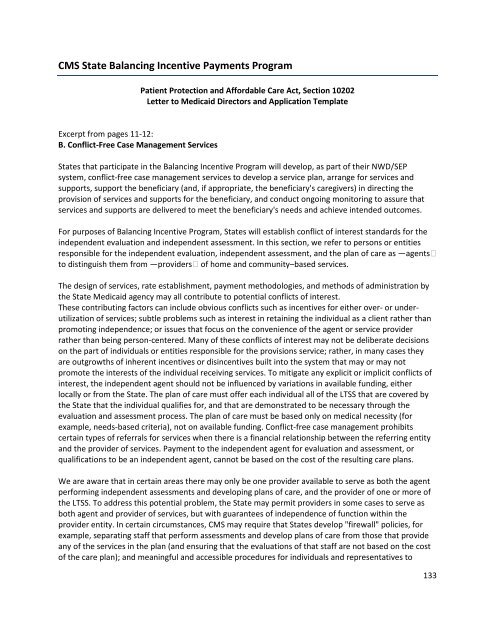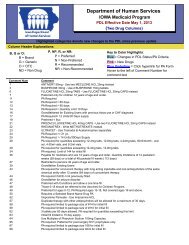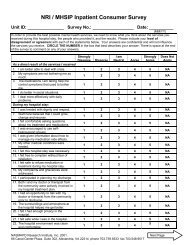Iowa Mental Health and Disability Services System Redesign Interim ...
Iowa Mental Health and Disability Services System Redesign Interim ...
Iowa Mental Health and Disability Services System Redesign Interim ...
- No tags were found...
You also want an ePaper? Increase the reach of your titles
YUMPU automatically turns print PDFs into web optimized ePapers that Google loves.
CMS State Balancing Incentive Payments Program<br />
Patient Protection <strong>and</strong> Affordable Care Act, Section 10202<br />
Letter to Medicaid Directors <strong>and</strong> Application Template<br />
Excerpt from pages 11-12:<br />
B. Conflict-Free Case Management <strong>Services</strong><br />
States that participate in the Balancing Incentive Program will develop, as part of their NWD/SEP<br />
system, conflict-free case management services to develop a service plan, arrange for services <strong>and</strong><br />
supports, support the beneficiary (<strong>and</strong>, if appropriate, the beneficiary's caregivers) in directing the<br />
provision of services <strong>and</strong> supports for the beneficiary, <strong>and</strong> conduct ongoing monitoring to assure that<br />
services <strong>and</strong> supports are delivered to meet the beneficiary's needs <strong>and</strong> achieve intended outcomes.<br />
For purposes of Balancing Incentive Program, States will establish conflict of interest st<strong>and</strong>ards for the<br />
independent evaluation <strong>and</strong> independent assessment. In this section, we refer to persons or entities<br />
responsible for the independent evaluation, independent assessment, <strong>and</strong> the plan of care as ―agents<br />
to distinguish them from ―providers of home <strong>and</strong> community–based services.<br />
The design of services, rate establishment, payment methodologies, <strong>and</strong> methods of administration by<br />
the State Medicaid agency may all contribute to potential conflicts of interest.<br />
These contributing factors can include obvious conflicts such as incentives for either over- or underutilization<br />
of services; subtle problems such as interest in retaining the individual as a client rather than<br />
promoting independence; or issues that focus on the convenience of the agent or service provider<br />
rather than being person-centered. Many of these conflicts of interest may not be deliberate decisions<br />
on the part of individuals or entities responsible for the provisions service; rather, in many cases they<br />
are outgrowths of inherent incentives or disincentives built into the system that may or may not<br />
promote the interests of the individual receiving services. To mitigate any explicit or implicit conflicts of<br />
interest, the independent agent should not be influenced by variations in available funding, either<br />
locally or from the State. The plan of care must offer each individual all of the LTSS that are covered by<br />
the State that the individual qualifies for, <strong>and</strong> that are demonstrated to be necessary through the<br />
evaluation <strong>and</strong> assessment process. The plan of care must be based only on medical necessity (for<br />
example, needs-based criteria), not on available funding. Conflict-free case management prohibits<br />
certain types of referrals for services when there is a financial relationship between the referring entity<br />
<strong>and</strong> the provider of services. Payment to the independent agent for evaluation <strong>and</strong> assessment, or<br />
qualifications to be an independent agent, cannot be based on the cost of the resulting care plans.<br />
We are aware that in certain areas there may only be one provider available to serve as both the agent<br />
performing independent assessments <strong>and</strong> developing plans of care, <strong>and</strong> the provider of one or more of<br />
the LTSS. To address this potential problem, the State may permit providers in some cases to serve as<br />
both agent <strong>and</strong> provider of services, but with guarantees of independence of function within the<br />
provider entity. In certain circumstances, CMS may require that States develop "firewall" policies, for<br />
example, separating staff that perform assessments <strong>and</strong> develop plans of care from those that provide<br />
any of the services in the plan (<strong>and</strong> ensuring that the evaluations of that staff are not based on the cost<br />
of the care plan); <strong>and</strong> meaningful <strong>and</strong> accessible procedures for individuals <strong>and</strong> representatives to<br />
133

















